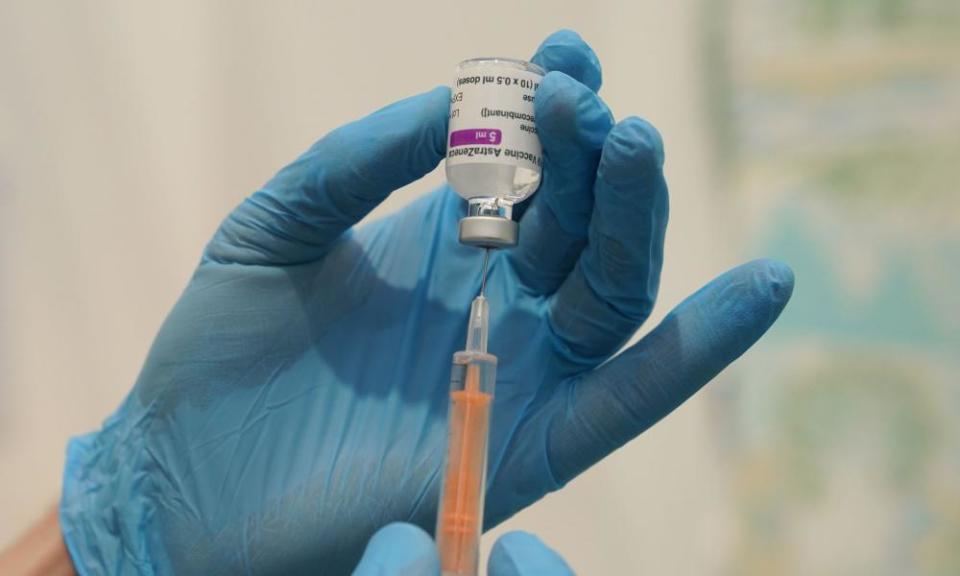Why experts say there is no basis to claims in Germany about efficacy of AstraZeneca vaccine

A row has broken out after German newspapers suggested the Oxford/AstraZeneca vaccine might have a lower efficacy among the over-65s. Below we take a look at the claims, and whether we should be concerned.
What is the story?
On Monday, the German newspaper Handelsblatt claimed that the Oxford/AstraZeneca vaccine might only have an efficacy of about 8% among those over the age of 65 – a figure far lower than the 70% overall efficacy among adults reported by researchers last year (efficacy was reported to be 62% among those given two full doses of the vaccine, the regime subsequently approved by the UK’s Medicines and Healthcare products Regulatory Agency).
What have the researchers and vaccine developers said?
Both have pushed back strongly against the claims. A University of Oxford spokesperson said clinical trials showed similar immune responses in younger and older adults, a good safety profile and high efficacy in younger adults. “There is no basis for the claims of very low efficacy of the Oxford/AstraZeneca vaccine which have been circulating in the media,” they said.
While it is true that there was less data from older adults involved in the trials, the team say early figures were promising: “Preliminary efficacy data in older adults supports the importance of this vaccine for use in this population,” they said.
A spokesman for AstraZeneca also denied the reports were valid.
“Reports that the AstraZeneca/Oxford vaccine efficacy is as low as 8% in adults over 65 years are completely incorrect. In the UK, the [Joint Committee on Vaccination and Immunisation] supported use in this population and MHRA included this group without dose adjustment in the authorisation for emergency supply,” they said.
“In November, we published data in the Lancet demonstrating that older adults showed strong immune responses to the vaccine, with 100% of older adults generating spike-specific antibodies after the second dose.”
Watch: 2 more COVID-19 vaccine trials raise hope for more doses
What does Germany make of this?
At present, it remains unclear exactly who the source of the Handelsblatt report is, and what data they might be basing the figure on.
The German health ministry has challenged Handelsblatt’s report, saying it mixed up the efficacy rate in over-65s and the proportion of older people involved in the vaccine trials. The German health minister, Jens Spahn, described the Handelsblatt article as “speculation” on Tuesday morning and declined to comment while the European Medicines Agency (EMA) said analysis of AstraZeneca’s trial data was ongoing.
Downing Street said the UK’s chief scientific adviser, Sir Patrick Vallance, told the British cabinet that the Oxford/AstraZeneca vaccine had been shown to be effective in both younger and older people. “The chief scientific adviser set out that the Oxford/AstraZeneca vaccine remains both safe and effective and that the trials showed similar immune responses in both younger and older adults,” a No 10 spokesman said.
It is possible the EMA and other bodies involved in analysing data for approval of the Oxford/AstraZeneca vaccine in Europe may have had access to data beyond that available to the MHRA when it weighed up approval for the UK last year.
“Elderly people were recruited to the UK phase 3 relatively late and were relatively well shielded, so there were few cases of Covid that had occurred at the time of submission of data to MHRA for approval. There may have been more by the time of EMA submission,” said Prof Adam Finn, a professor of paediatrics at the University of Bristol, who was involved in the Oxford/AstraZeneca vaccine work.
But the Guardian understands that the EMA has not been given further data, it had only received answers to questions about the existing data.
Finn added that researchers were “baffled” as to where the 8% figure came from, with others adding that lower efficacy among older adults would be a surprise given the immune response among this group seen in the clinical trials.
What is the UK response?
Downing Street has sought to play down any potential row.
“AstraZeneca are committed to delivering 2m doses a week to the UK, and we’re not expecting any changes to that,” Boris Johnson’s spokesman said. According to government figures, so far more than 6.5 million people in the UK have received at least one dose of a Covid vaccine.
But Prof Martin Marshall, chair of the Royal College of GPs said that while uptake of Covid vaccines so far has been encouraging, people’s confidence in the jabs could be put at risk by reports that cast doubt on its efficacy.
“We need high uptake to protect the population against this virus, and start getting life back to normal again,” said Marshall. “This particular report has been strongly denied by manufacturers of the vaccine. Patients should be reassured that both the Pfizer/BioNtech vaccine and the Oxford/AstraZeneca vaccine, which are being used in the UK, have been through a rigorous approval process by the MHRA to ensure they are both safe and effective.”
Daniel Freeman, professor of clinical psychology at the University of Oxford, said the row highlighted that messaging about vaccines should be strong and clear.
“It is another reminder that it is crucial that accurate information about vaccines and their testing is repeatedly presented in a compelling way so that it sticks,” he said.
“Messaging must be strong and clear. Then if there are mistakes in reporting or misinformation then there is less of an impact. There is a large appetite for information about vaccines and people are not scared of detail but are actively seeking it.”
• This article was amended on 26 January 2021. A previous headline did not sufficiently convey the conclusions of the article and, if read without the context of the text, had the potential to be misunderstood.
Watch: More than 100 million Covid-19 cases recorded worldwide

 Yahoo Finance
Yahoo Finance 